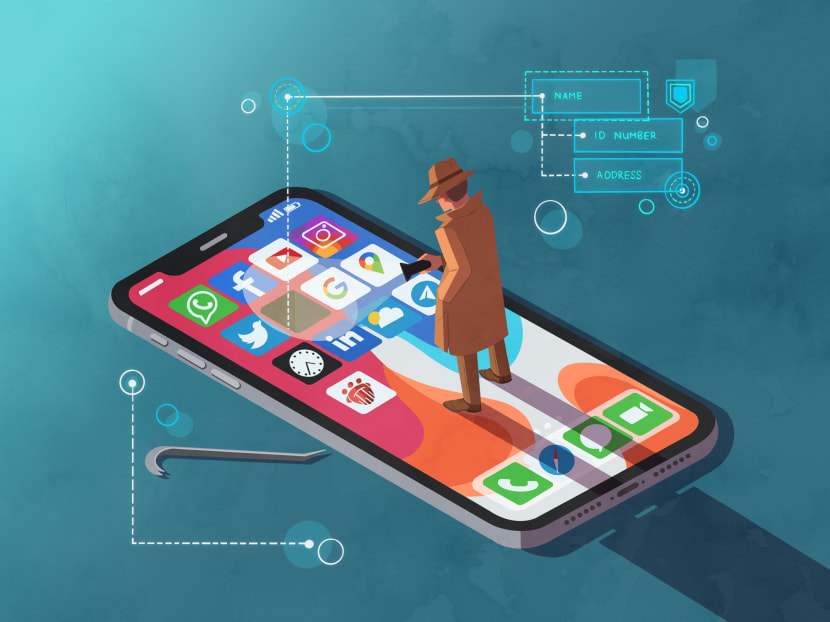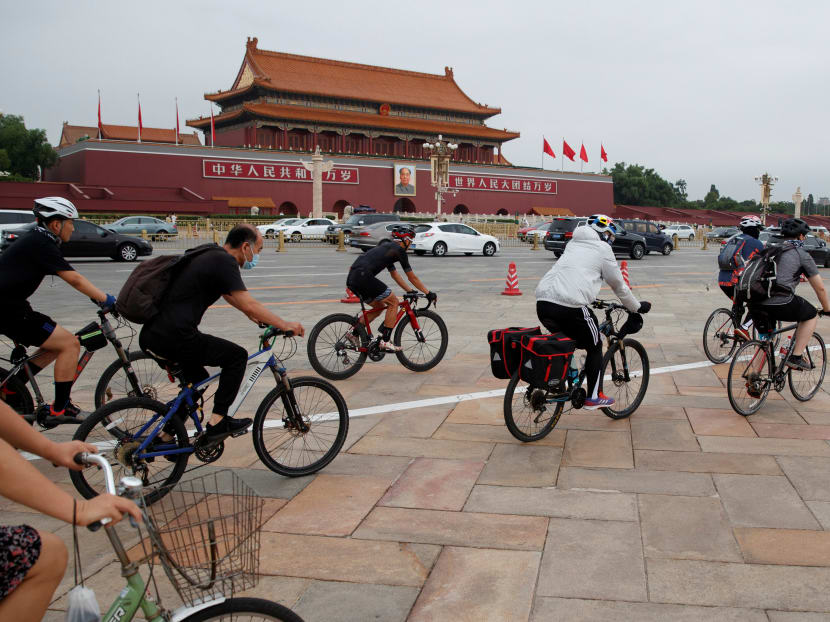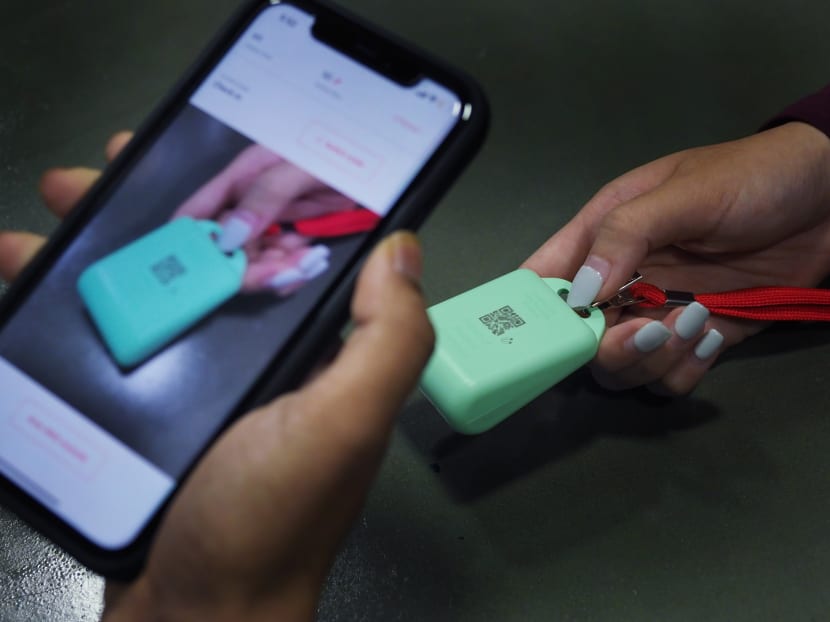The Big Read: What’s the big deal with data privacy? Thorny, complex issues confront citizens and govts
SINGAPORE — When messaging app WhatsApp’s new privacy policy sparked a global exodus from its services, Mr Darren Chin’s company — a local tech firm — decreed that its entire staff was to cease using the Facebook-owned platform for work.

The enormous use of personal data by corporates and governments have become part and parcel of today’s connected society and quality of life, but also risks being misused or falling into the wrong hands.
- The issue of data privacy has come under the spotlight, with debates triggered by the police’s use of TraceTogether data and the privacy policy changes of WhatsApp
- Besides your name, age, gender, education and employment, data companies know what vehicle you own, the size of your home, your socioeconomic status, the websites you visit, your tendency to default on loans, and even your health problems
- The enormous use of personal data by corporates and governments have become part and parcel of today’s connected society and quality of life, but also risks being misused or falling into the wrong hands
- Data privacy law differs from country to country. Experts say Singapore’s Personal Data Protection Act is not designed to ensure data privacy as its chief aim, but was conceived to achieve a narrower goal of protecting personal user data
- The onus is also on the individual to keep asking questions about their personal data and not simply sign away their privacy, experts added
SINGAPORE — When messaging app WhatsApp’s new privacy policy sparked a global exodus from its services, Mr Darren Chin’s company — a local tech firm — decreed that its entire staff was to cease using the Facebook-owned platform for work.
“We’ve all been using WhatsApp for many years, but the company’s top management decided to ban it and we cannot say no,” said Mr Chin, 52.
“Everyone in the tech chat groups in my company switched to Signal, so I did so as well. I agree with the decision too: Data privacy is important to me,” the IT operations specialist told TODAY — ironically in an interview conducted over Facebook at his request.
Signal, as well as Telegram, are rival encrypted messaging apps that have surged in popularity amid the fiasco as an alternative to WhatsApp.
WhatsApp has since come forward to clarify that its new terms will not allow its parent company to access the app users' messages, and delayed its February deadline for users to accept the terms. But the new policy will still allow WhatsApp to share more information with Facebook and roll out advertising and e-commerce.
Around the same time, a similar controversy unfolded involving Singapore’s contact-tracing system TraceTogether, after Singaporeans found out earlier this month that their Bluetooth proximity data could be used for criminal investigations.
This led some users to switch off their apps or leave their tokens at home, despite the fact that such data is critical in fighting the unprecedented Covid-19 pandemic, TODAY previously reported.
The dust has yet to settle on both controversies. The Singapore Government announced on Jan 8 that it would introduce new legislation to limit how the police might use TraceTogether data to investigate only serious offences, such as murder, terrorism and rape.

Still, the events of the past two weeks have stirred up intense interest among many in Singapore on the topic of personal data, leading an enterprising few to pore through the privacy policies of their social media services or probe through the Criminal Procedure Code, the law that empowers the policing authorities here to access all kinds of data for investigative purposes.
Work and social chat groups have also been uprooted from WhatsApp as some decided to switch to a different platform, before continuing their spirited discussions on the topic.
A survey by accounting firm KPMG in 2016 found that compared to other citizens in Asia, Singaporeans felt the most defenceless over the way organisations handled and used their personal information, and were also among the most concerned about the handling and use of their personal data.
Despite this, most people still have no qualms clicking through message prompts that say “I consent to the use of my data” whenever they are using a new device, downloading a new application, or visiting a website for the first time.
Professor Simon Chesterman, dean of the National University of Singapore (NUS) Faculty of Law, said: “Something that has long puzzled those who study data protection laws is the wide gap between what people say and what they do.
“Everyone claims to care about privacy in theory, but then in practice they share the most intimate details of their life with telco companies, or through social media, the whole world.”
While awareness of data privacy has grown among Singaporeans since the Personal Data Protection Act (PDPA) came into force in 2012, there is still a lack of understanding of whether their digital footprint is being used by others for fair or foul purposes.
With the help of technologists, lawyers, privacy researchers and advocates, TODAY explores the debate that lies at the intersections of commerce, law and ethics.
THE BUSINESS OF DATA
In October 2000, Google released its advertising platform AdWords for the first time, a service that allows advertisers to target potential customers by matching the ad to their Google searches.
By 2019, Google advertising had become responsible for a whopping 83 per cent of its revenue of US$160.7 billion (S$213.03 billion) — all the while allowing people to Google things on the internet for free.
To many people, it is a boon to get a customised, online experience without paying a single cent, because your device knows what you like and predicts what you want to see.
“Data has become crucial to providing enhanced user experiences, creating a more connected society and improving our quality of life,” said Ms Rachel Ler, general manager and vice-president of data protection firm Commvault.
Google’s success story mirrors that of the other Big Tech firms, Amazon and Facebook, as well as the multi-billion dollar industry of smaller-sized data brokers that has blossomed since the dawn of the internet.
Associate Professor Lim Yee Fen, an author of six books on privacy law and technology, said: “The amount of information about you held by private companies and governments is enormous — they know more about you than you know about yourself.
“It’s no question that an entity like Facebook can easily build a full profile about you, about where you live, where you work and also what you are,” said the business law professor at Nanyang Technological University (NTU)’s Nanyang Business School.
Today, there are more than 4,000 data brokerage firms around the world that collate databases of people by scraping the data from online records or buying them outright.
Acxiom, one of the largest data brokers that is based in the United States, has detailed lists of around 2.5 billion people in more than 60 countries, a figure that it proudly boasts on its corporate website.
Associate Professor Terence Sim, the assistant dean of communications at the NUS School of Computing, said: “Companies are willing to pay for such data to better target their advertisements, or to discern customers' needs, or simply to increase its base of customers.”
It is hard to pin down a dollar value on how much personal data is worth, Assoc Prof Sim said, noting that there is also a substantial degree of personal data being traded on the dark web.
The variety of data that feeds this industry is staggering — Acxiom knows 11,000 things about each person in its database, for example.
Besides your name, age, gender, education and employment, these companies know what vehicle you own, the size of your home, your socioeconomic status, the websites you visit, your tendency to default on loans, and even your health problems.
And these databases by brokers arguably pale in comparison to what Facebook, Alibaba, Google, or even your local telco and credit card company, knows about you, since their users voluntarily submit personal information in order to use these services, said experts.
Mr Alfred Siew, who co-founded tech-centric news portal Techgoondu, said: “The scary thing is the market power that some of these private companies have, especially when they expand into adjacent industries that they previously had no business in — like Facebook rolling out its own cryptocurrency, for example.”
He cited a 2012 case when Target, a chain of departmental stores in the US, sent coupons for baby clothes and cribs to a girl who was still in high school, prompting complaints from her father.
The store manager apologised for the error, but as it turned out, it was Target’s pregnancy prediction system that correctly guessed that the girl was pregnant.
“Her father just didn’t know. Target knew about his daughter’s pregnancy before he did,” said Mr Siew.
Target’s prediction model, as reported by the New York Times, allows it to expand its sales for a demographic of expecting parents, whose willingness to shop “are more flexible than at almost any other time in their adult lives”.
All the store needed to put together was shoppers’ profiles and data about their shopping habits, as well as home addresses in order to send discount coupons that targeted their preferences.

At the time, people were already calling such data collection and number crunching a step too far for companies.
But today, there is a wide range of scenarios that such data collection can be misused, and the users would be none the wiser, said experts.
What is worse is when firms that collect data — whose business it is to know how their users’ data is handled — often do not know either.
In 2018, the personal data and medical records of around 1.5 million SingHealth patients were hacked in a state-sponsored attack. An inquiry later found that system vulnerabilities and staff lapses had enabled the data breach to occur.
That same year, Facebook faced a strong backlash from users when the Cambridge Analytica scandal was uncovered.
The British political consulting firm — now defunct — had improperly obtained the private psychological profiles of millions of Facebook users and provided data analytics to Mr Donald Trump’s campaign in the 2016 US presidential election.
When Facebook revealed that it found out about the leaked data and had acted to stop Cambridge Analytica’s data collection, the damage was already done.
Assistant Professor Reza Shokri, who is the NUS Presidential Young Professor of Computer Science, said: “(Such misuses) could have a severe effect, for example, a loss of trust, and having a hypocritical society where citizens feel that they need to always hide something from others due to this lack of trust.”
Assoc Prof Sim added that another danger comes from a phenomenon known as “function creep”, in which personal data is used for a purpose other than the one for which it was first given.
“One example is using TraceTogether data for criminal investigation when its original purpose was for contact tracing. Function creep is a breach of privacy, unless explicit consent is obtained from the person concerned for the secondary usage of his data,” he said.
THE AMORPHOUS CONCEPT OF DATA PRIVACY
While data privacy is a concept that originates in Western countries and is protected by their respective constitutions, the laws in Singapore, namely the PDPA, are not designed with the chief aim to ensure data privacy.
In general, data privacy concerns the right of a person to be “left alone” by data firms, though its definitions are still amorphous and being debated by scholars, said Mr Steve Tan, a partner at law firm Rajah & Tann.
Mr Tan said the notion of privacy in the US is attached to the concept of freedom and individual rights, while in Europe, it is about the honour and dignity of the person.
Internet laws in these jurisdictions thus prioritise data privacy, such as European Union’s General Data Protection Regulation (GDPR), which imposes harsh penalties on firms that collect data without following stringent conditions.
On the other hand, the PDPA was conceived to achieve a narrower aim of ensuring data protection, which is about safeguarding personal data from misuse and unauthorised access. Data protection is a subset of data privacy, Mr Tan added.
Around 2010, the authorities here had recognised that there was no such law at the time, and sought to find a balance between giving companies the ability to harness personal data for business innovation purposes and giving individuals the right of consent.
“For Singapore, the impetus for us to come up with data protection regulation was because of the digital economy and the globalisation of such an economy, where you see a proliferation of data being transferred all around the world,” said Mr Tan, an NUS adjunct professor who lectures about privacy and data protection laws at the university’s law faculty.
In a nutshell, the PDPA governs the collection, use, disclosure and care of personal data, and recognises both the rights of individuals to protect their personal data and the needs of organisations to use personal data for legitimate and reasonable purposes.
While the PDPA does not apply to the Government, Mr Tan said that even if it did, there will still be an exception when it comes to crime and security. This is similar to GDPR exemptions for law enforcement and national security.
The use of aggregated personal information and public surveillance data to fight crime and deter security threats is a growing trend around the world, though such Minority Report-esque measures are not always greeted with enthusiasm.
One oft-cited example is China’s social credit scoring system, which uses a combination of personal data and state surveillance to reward or punish behaviours, and has attracted the ire of privacy advocates.
In the Netherlands, police are trialling a data project that uses a network of sensors to measure noise levels and emotional tones in voices, which can trigger a police intervention as an increase of these levels above certain thresholds imply greater crime risk.

In 2019, Second Minister for Home Affairs Josephine Teo also spoke about the potential of using data analytics to make “predictive policing” a reality, though she gave few details of what this entails.
Some of those interviewed said more privacy safeguards are needed, which would ultimately foster trust among individuals, corporations and governments.
One key tenet of data legislation is that personal data belongs to the person who generates it, and not the organisations that collect and compile them, they said.
“Ensuring privacy is a way to establish trust and balance the power between individuals and organisations,” said Dr Shokri from NUS.
“Without privacy, the balance of power changes towards the governments and big corporations, which can significantly influence individuals in many different ways… Studies show that individuals under observation are more risk-averse and less creative.”
Nevertheless, the debate is not about the irreconcilable differences between an individual’s privacy and the greater good of society, said experts.
With TraceTogether, for example, contact tracing can be performed without the need to collect and share contacts in real-time with the authorities, said Dr Shokri.
“It is a fact that most of the ‘good’ can still be achieved with privacy in mind,” he added.
And although societies have not agreed what is the right path to take, analysts noted that the rest of the world is gradually moving towards Singapore’s version of data protection laws, rather than continue to beat the drum of protecting users’ privacy above all else.
One 2018 study from the Tilburg University in the Netherlands concluded that the EU’s GDPR law is “growing so broad that the good intentions to provide the most complete protection possible are likely to backfire in a very near future, resulting in system overload”.
The study by Associate Professor Nadezhda Purtova argued that the GDPR has become bogged down by compliance rules that constricts innovation and are impossible to maintain, since most data useful to businesses can be considered personal data and can trigger GDPR rules.
NUS’ Prof Chesterman said: “I think the world has largely shifted away from privacy — in the sense of being able to isolate yourself from the public gaze — to data protection.
“Rather than wanting to be ‘left alone’, what most of us want is some measure of control over how information about us is collected, used, and disclosed. It’s telling, for example, that not only the PDPA but also the EU’s GDPR don’t really use the word ‘privacy’ any more.”
SAFEGUARDS ARE A WORK-IN-PROGRESS
Giving individuals some control means putting in place better safeguards that can give them greater confidence over how their data is being used and ensuring that companies that hold data are transparent.
For example, the Monetary Authority of Singapore is developing “fairness metrics” for the use of artificial intelligence (AI) and data analytics in credit risk scoring.
The move comes as more financial technology (fintech) firms are adopting automated machine learning AI to assess a person’s creditworthiness based on personal data that are not usually used by traditional banks, such as his or her spending habits, professional background and lifestyle.
Rajah & Tann’s Mr Tan said: “AI decision-making is still at a very nascent level and there are of course a lot of privacy issues. The key issue is that the AI could decide wrongly, or have a bias, causing unfair outcomes.”
Last year, the Infocomm Media Development Authority (IMDA) and the Personal Data Protection Commission (PDPC) also launched a guide to help companies share data securely with trusted partners.
Commvault’s Ms Ler added that having the right tools and keeping regulations in check are key to ensuring data is being collected, used and stored properly.
“Just as companies need to gain the trust of customers and partners when they hold on to data for business purposes, transparency needs to be built on a national level as well,” she said.
Using the Government’s pledge to delete sensitive TraceTogether data once it is no longer needed as an example, she said this requires a framework of sophisticated data management to ensure that datasets are appropriately tagged, protected and accessed.

But while the state may have the muscle and know-how, many businesses that handle customers’ data still “don’t get it”.
NTU’s Assoc Prof Lim said: “The big problem is that for a lot of organisations here who claim to understand the government requirements, in practice, they only see data protection as a compliance burden or cost. They don’t realise that it could end up being a cybersecurity issue that could bankrupt them.”
Cybersecurity solutions are expensive, but the penalties and consequences of data breaches are higher. Firms with an annual turnover exceeding S$10 million can be fined up to 10 per cent of their revenue following the most recent amendments to the PDPA passed last year.
There is also the reputational hit that a business can suffer if it is found out that customer’s private data is poorly guarded.
Mr Tan, who has assisted many organisations with investigations by the PDPC, said that there are plenty of small- and medium-sized enterprises (SMEs) which are too resource-strapped to comply.
“That's the reality. A lot of SMEs are under the radar until there's a complaint or when something happens and they are taken to task. It is not because they aren’t aware of data protection laws, but are so focused on survival that they decide to take a calculated risk,” he said.
Another chink in Singapore’s data protection law is that the PDPA does not consider anonymised data as personal data, the experts noted.
Data anonymisation is a way to strip out any personal identifiers such that the person where the data comes from cannot be identified. Data analysts use such data to look for trends and patterns among a population without needing to identify the source of the data.
But anonymised data is easily re-identifiable by combining multiple sources of anonymous data, said NUS’ Assoc Prof Sim.
This is because any data related to individuals is extremely unique, even if no identifying attributes such as name or ID numbers are used.
Dr Shokri said: “On average, it is enough to know the five locations that you routinely visit during a day — your home, your workplace, the gym you go to, the restaurant you go for dinner, the school where you dropped off your child — to identify you among everyone on Earth.
“Knowing eight friends on social media also makes you unique. The same is true about your medical record, the people you call or message regularly, the movies you watch, the websites you go, the people that you meet and have contact with on a daily basis.”
There is no way data can be truly anonymised, unless noise and uncertainty are intentionally added to the dataset, thereby “damaging” the data.
A recent US study found that with 15 demographic attributes, it is possible to identify 99.98 per cent of Americans.
Prof Chesterman said: “One thing that we’re increasingly realising is that even small amounts of information can be pieced together to build a pretty accurate picture of you as an individual.”
But amid the furore over the TraceTogether data and WhatsApp privacy policy, several experts disagreed with the position some people took — comments such as “I have nothing to hide, therefore I have nothing to fear” are a fallacy that comes from wilful ignorance.
Assoc Prof Lim said: “It is not about hiding. It is about whether you value your personal safety or your family’s safety, it’s about preventing unsavoury characters from showing up at your door, or telemarketers bugging you on the phone, because you don’t know how your data can be misused.”
But this does not also mean that people should quit technology altogether, out of an inordinate fear that their personal data will be abused.
Rather, experts said the onus is also on the individual to keep asking questions about their personal data and not simply sign away their privacy. When all is said and done, users should try to understand why they are consenting to data use and privacy policies when prompted.
Techgoondu’s Mr Siew said: “We’ve come to get used to the conveniences of things like Google Maps that it will be hard to give it up. But you also do not have to make a binary decision between having to stop using the service completely, versus using it blindly.”
Faced with consumer pressure over privacy concerns, Google has become more transparent about its privacy policies and the type of personal data that it holds, he said.
“That is why it is a good thing that for the past two weeks, people are asking questions about WhatsApp and about TraceTogether, and are holding people and organisations accountable,” said Mr Siew.











